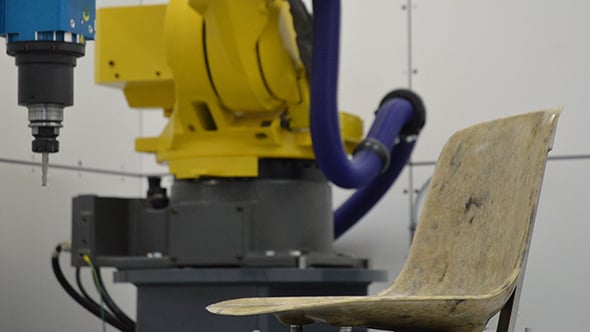
“Robotmaster is great for automatically detecting problems like joint limits, the robot’s reach limitations, and collisions and then creating error-free programs that resolve them.”
Loop Technology
- BUSINESS IMPACT -
Achieved a high-quality, smooth finish in the trimming trial
Gained increased productivity in the trimming process
Provided shorter lead times and substantial cost savings
Prevented machining errors and reduced process waste
Manufacturer of sustainable composite materials
Solidwool specializes in manufacturing sustainable composite materials crafted from British wool and bio-resin. Their unique composite is utilized in creating furniture, interior design finishes, and homewares. Committed to sustainability and reducing the carbon footprint of its products, Solidwool sought to enhance the efficiency of its manufacturing process.
Solidwool wanted to increase productivity when trimming bio-resin from furniture pieces
After the molding process, Solidwool must trim excess bio-resin from the edges of their chairs. Traditionally, this task was performed manually using a disc cutter or a CNC machine. However, manual trimming was time-consuming, variable, and dependent on operator skill. CNC machines presented cost limitations and reduced flexibility compared to a multi-axis robotic solution.
“Robotmaster is great for automatically detecting problems like joint limits, the robot’s reach limitations, and collisions and then creating error-free programs that resolve them. The path optimization tool allows for rotation in the TCP, ensuring a collision and singularity-free path, which optimizes the reach of the robot arm. These features were extremely useful, allowing RoboMACH HA to trim the excess bio-resin with precision, creating a beautiful chair made from sustainable composite material.”
Robotmaster offline programming and robotic programs for chair trimming
To address Solidwool's challenge, industrial automation specialists Loop Technology and a Robotmaster Authorized Partner proposed a feasibility study using their RoboMACH HA cell, a high-accuracy robotic machining system for complex, large-volume applications. The study explored the potential benefits of robotic machining in improving efficiency and sustainability.
The robotic programs for chair trimming were generated using Robotmaster offline programming and robot simulation software. Robotmaster is known for its ease of use, powerful toolpath creation, optimization capabilities, and program validation, giving users of varying experience levels confidence when outputting robot programs.
A CAD model of the chair is imported into the virtual RoboMACH HA cell, which was created in Robotmaster. Features such as fixtures are modeled to ensure the robot avoids them.
The cutting paths are created by selecting the chair's edges. Two paths are created as trimming would need to be done in two parts using the rotary table.
A simulation is run to visualize the process and apply any adjustments to the generated cutting paths, such as a tool path offset and Z-position.
Robotmaster translates the cutting paths into robot paths. The software flags up problems such as limits reached or collisions and the paths are modified directly in the software.
The robot paths are assigned to a post-processer to handle the supporting functions, such as the spindle RPM.
Finally, the generated robot code is transferred to the FANUC M800iA/60 robot.
This feasibility study provided Solidwool with valuable insights into the capabilities of robotic machining and its potential integration into their manufacturing process. The knowledge gained will be crucial in informing their future expansion plans.